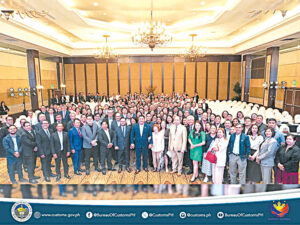Efficient transportation of goods relies on a smooth multimodal logistics network, which requires collaboration. This is why the Bureau of Customs (BoC) has strengthened its commitment to efficiency and modernization by forming strategic partnerships with various agencies, private institutions, and industry stakeholders.
These collaborations aim to streamline customs operations, enhance trade facilitation, and combat illicit activities, ultimately boosting revenue collection and improving public service delivery.
For instance, the agency launched the Customs Industry Consultative and Advisory Council (CICAC) on Feb. 2, 2024, under Customs Memorandum Order No. 02-2024. The council serves as a platform for industry players to voice concerns and contribute to customs process improvements. By June 30, the Central CICAC had 25 member organizations, while the District CICACs had 117 active members.
Back in October, International Container Terminal Services, Inc. hosted the second General Assembly of the CICAC. The assembly brought together over 200 representatives from importers, companies, industries, organizations, and foreign chambers in the country. The discussions covered streamlining customs clearance processes, achieving revenue targets, and addressing industry-specific challenges, among others.
The Bureau of Customs Port of Cebu recently convened with various organizations at the Cebu South Harbor Container Terminal (CSHCT) to discuss ways to improve efficiency in customs clearance and strengthen coordination between ports and stakeholders in response to President Ferdinand Marcos, Jr.’s directive to establish a 24/7 shipment process across the Philippines.
The Bureau of Customs Port of Clark and the Department of Tourism (DoT) also entered into a Memorandum of Understanding (MOU) on May 11, 2024. The agreement, signed at the Clark Freeport Zone in Pampanga, reinforces their commitment to the Filipino Brand of Service Excellence program, ensuring better customer service at tourism touchpoints nationwide.
BoC conducted the 2nd CICAC General Assembly last Oct. 25, 2024.
Meanwhile, the agency collaborated with F2 Logistics Philippines Inc. and Mandaue Foam Philippines to support BoC’s operations in Northern Mindanao.
To integrate blockchain technology into customs clearance and processing services, the Bureau of Customs formed a partnership with MY E.G. Services Berhad (MYEG) and Cargo Data Exchange Center Inc. (CDEC). The agreement introduces Ztrade, a Web3 and Artificial Intelligence (AI)-powered platform, through MYEG’s Zetrix layer-1 blockchain to streamline and secure trade transactions, particularly benefiting the Philippines’ largest trading partner, China.
Enhancing industry collaboration
As part of its initiatives, the Bureau of Customs has partnered with the Association of International Shipping Lines (AISL) to revolutionize the way the BoC monitors container movement and manages overstaying containers. The collaboration aligns with the goals of Customs Administrative Order No. 08-2019, which focuses on generating non-traditional revenue streams by efficiently tracking and managing overstaying containers at ports.
The BoC also tapped the Land Bank of the Philippines to implement the Link.BizPortal for digital payments of miscellaneous fees. Signed on March 4, 2024, this agreement is expected to enhance operational efficiency, reduce bureaucratic delays, and simplify payment processes for stakeholders.
The agency also joined forces with the National Telecommunications Commission (NTC) to educate the public on scams involving parcels and balikbayan boxes. This initiative aims to raise awareness about fraudulent schemes and provide clear guidelines on legitimate customs procedures.
Meanwhile, BoC, in collaboration with the Philippine Drug Enforcement Agency (PDEA) and the National Bureau of Investigation (NBI), has ramped up efforts to intercept illegal drugs. By mid-2024, the agency had seized P2.277 billion worth of narcotics through 80 operations. Shabu (methamphetamine) was the most commonly confiscated drug, followed by marijuana and ecstasy. A high-profile bust occurred at the Paircargo Warehouse in Pasay City, where authorities intercepted 32 kilograms of shabu valued at P218.484 million.
Furthermore, the BoC intensified its anti-smuggling operations, conducting 868 enforcement actions in the first half of 2024, resulting in seizures worth P55.171 billion. Among these, counterfeit goods valued at over P29.738 billion were confiscated, including luxury brand imitations.
The Intellectual Property Rights Division’s crackdown on fake products culminated in a significant operation last June 2024, where P11 billion worth of counterfeit goods were seized. This enforcement effort was recognized by the Intellectual Property Office of the Philippines (IPOPHL) through an award presented to the Bureau of Customs on April 29, 2024.
Supporting national development goals
BoC’s strong enforcement and efficiency measures have translated into high revenue collection figures. From January to June 2024, the agency collected P455.518 billion, surpassing its target by 2.91% or P12.897 billion.
The agency attributes this financial success to its improved valuation techniques, diversified revenue sources, and the continued digitalization of customs systems.
Beyond revenue collection and enforcement, the Bureau of Customs has contributed to various government agencies through donations of forfeited goods. — Mhicole A. Moral

